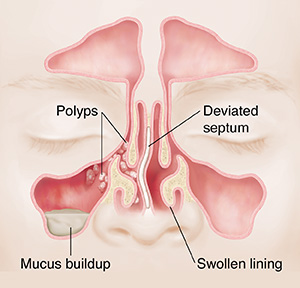Understanding Sinus Problems
The sinuses are hollow structures in the skull located behind the forehead, nasal bones, cheeks, and eyes. They are filled with air and normally secrete small amounts of mucus that drains through the nose. Sinusitis is the inflammation of the inner lining of the sinuses. This generally occurs due to allergies or infections.
You don’t often think about your sinuses until there’s a problem. One day you realize you can’t smell dinner cooking. Or you find you often have headaches or problems breathing through your nose.
Symptoms of sinus problems
Sinus problems can cause uncomfortable symptoms. Your nose may run nonstop. You might have trouble sleeping at night. You may even lose your sense of smell. Other symptoms are:
-
Nasal congestion
-
Fullness in ears
-
Toothache
-
Green, yellow, or bloody drainage from the nose
-
Drainage in your throat
-
Bad breath
-
Trouble smelling and tasting food
-
Frequent headaches
-
Face pain or pressure in your cheeks, forehead, nose, and ears, or between your eyes
-
Coughing that may be worse at night
-
Fatigue
When sinuses are blocked

If something blocks the passages in the nose or sinuses, mucus can’t drain. The sinuses may then become infected.
-
Colds cause the lining of the nose and sinuses to swell and make extra mucus. A buildup of mucus can lead to a sinus infection.
-
Allergies irritate turbinates and other tissues. Turbinates are tiny structures inside the nose that filter and humidify air that passes through the nostrils into the lungs. This causes swelling, which can cause a blockage. Over time, this irritation can also lead to sacs of swollen tissue (polyps).
-
Polyps may form in both the sinuses and the nose. Polyps can grow large enough to clog nasal passages or the openings of sinuses in the nose and block drainage.
-
A crooked (deviated) septum may block nasal passages. This is sometimes because of an injury.
-
Other conditions, such as cystic fibrosis or HIV, may also be associated with sinus infections.
© 2000-2024 The StayWell Company, LLC. All rights reserved. This information is not intended as a substitute for professional medical care. Always follow your healthcare professional's instructions.